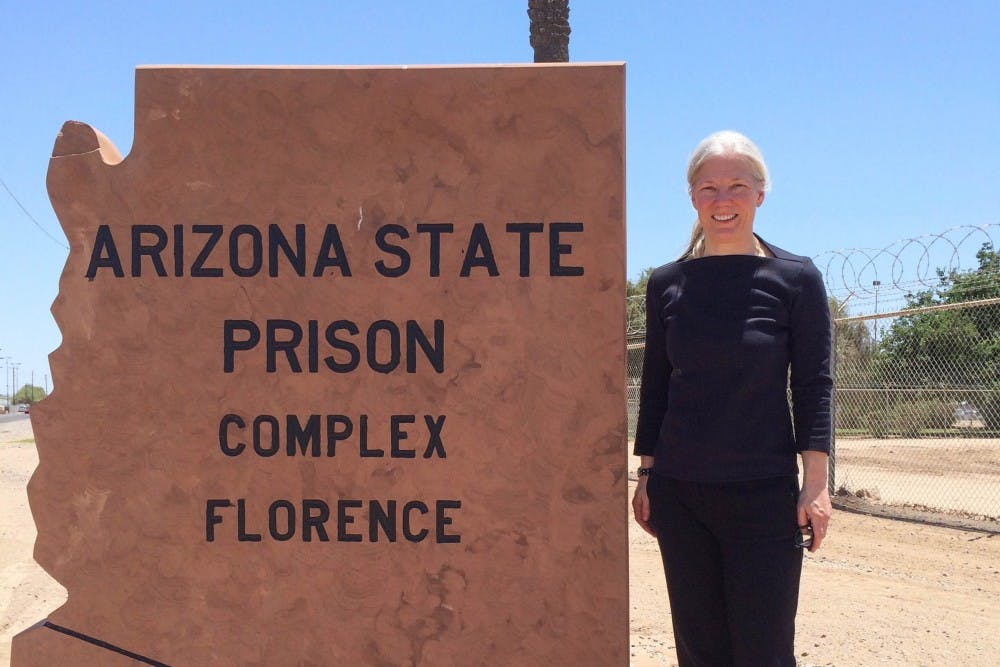As she was guided across the Florence State Prison complex on a hot June day, ASU professor Devoney Looser said she was nervous and didn't know what to expect from her newest pupils: a group of men imprisoned for sexual offenses.
But what Looser said she found was a classroom of men eager to learn about the writings of 18th-century writer Jane Austen.
Looser, a foundation professor of English at ASU and author who specializes in Austen's writing, said that the works can teach readers about social structures, hierarchies, economics and gender relations.
“I think all of those things that make (Austen) successful in the regular classroom have a lot to offer in the prison classroom too," she said.
Looser was invited in June 2018 as a guest speaker for the class, which was offered through the Prison Education Programming at ASU's Department of English.
The program, among other efforts, hosts a variety of courses for ASU students to learn about incarceration and its intersection with literature, and it helps develop and support a network of initiatives connecting ASU students and faculty to education efforts within prisons across Arizona.
Cornelia Wells, the director of Prison Education Programming and a senior lecturer of English at ASU, said that education is a basic human right that should not to be deprived from anyone.
“(Prisoners) have a right to education because it is a human activity,” Wells said. “It’s part of who we are.”
Part of the purpose of the program is to take a more human-centric approach within the criminal justice system and help reduce the likelihood of repeat offenders.
Released prisoners are arrested at rates 30 to 45 times higher than the general population, according to the Office of Justice Programs' Sex Offender Management Assessment and Planning Initiative, but the RAND Corporation reports that prisoners who receive any sort of education are up to 43 percent less likely to reoffend and return to prison.
Looser said she makes no attempt to downplay the damage done by sex offenders, as she has seen the profound consequences of these types of crimes through working with survivors of campus sexual assault at ASU.
But everyone, she said, deserves an education, regardless of the reprehensible things they have done in the past.
“I think we should be doing much more to bring educational opportunities to prison environments,” Looser said. “Not only for the good of the prisoners, but for the good of the community.”
Joe Lockard, an associate English professor at ASU and the program's founder, invited Looser to teach at the prison and said he believes that there is an ethical imperative to teach prisoners.
Lockard, who has taught a prison literature class at ASU, teaches a poetry workshop every Friday with inmates at the Florence State Prison.
He said he not only sees firsthand how much prisoners value the opportunity to learn, but also the value of the work they produce.
Lockard said that the works of renowned writers such as Oscar Wilde and Jimmy Santiago Baca are examples of writers who wrote while in prison.
“Prisoners are engaged in the life of the imagination, just like the rest of us,” he said. “They're just as human.”
Wells said that the lack of education among most prisoners is a reason why many of them may enter prison in the first place. Prison education, she said, can help correct that systemic problem.
More than half of former prisoners only have a high school diploma or GED, according to the Prison Policy Initiative, and a quarter have no accreditation at all. This lack of education is part of the reason why formerly incarcerated individuals have a 27 percent unemployment rate, the organization said.
Wells said that addressing the problem requires a paradigm shift.
“We need rehab and education,” she said. “Not more prison and punishment.”
Reach the reporter at wpmcclel@asu.edu and follow @wpmcclelland on Twitter.
Like The State Press on Facebook and follow @statepress on Twitter.




